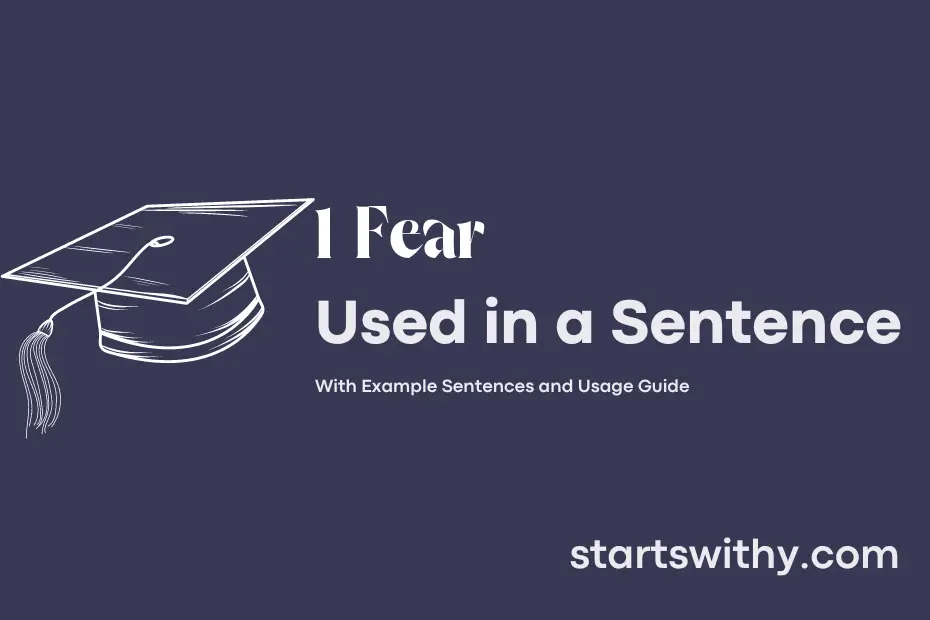Do you ever find yourself uncertain about how to properly use the phrase “I fear” in a sentence? This common expression is often used to express apprehension, concern, or worry about a particular situation or outcome. When crafted effectively, sentences using “I fear” can convey a sense of vulnerability or hesitation, adding depth to your communication.
Whether you are writing a formal essay, preparing a presentation, or simply engaging in everyday conversation, mastering the use of “I fear” can help you accurately communicate your thoughts and emotions. By understanding the nuances of this phrase and its impact on sentence structure, you can effectively convey your anxieties or reservations in a clear and concise manner. Let’s explore some effective ways to incorporate “I fear” into your sentences to enhance your communication skills.
7 Examples Of I Fear Used In a Sentence For Kids
- I fear the dark room at night.
- I fear the loud thunder during a storm.
- I fear getting lost in a big crowd.
- I fear the scary masks on Halloween.
- I fear the spooky sounds in the forest.
- I fear the big dogs that bark loudly.
- I fear the noisy fireworks on Diwali.
14 Sentences with I Fear Examples
- I fear failing my exams and not being able to achieve my academic goals.
- I fear not being able to find a job after graduation.
- I fear public speaking and presenting in front of my classmates.
- I fear missing out on important opportunities for internships or projects.
- I fear not being able to balance my academics and extracurricular activities effectively.
- I fear not being able to afford the rising cost of education.
- I fear being judged by my peers for my choices and decisions.
- I fear falling behind in my coursework and struggling to catch up.
- I fear being overwhelmed by the pressure to perform well in every aspect of college life.
- I fear losing motivation and drive to succeed in my studies.
- I fear not being able to meet the expectations of my parents and family.
- I fear experiencing discrimination or bias based on my background or identity.
- I fear missing important deadlines for assignments and projects.
- I fear not being able to make meaningful connections with my professors and classmates.
How To Use I Fear in Sentences?
I Fear is a phrase often used to express a feeling of worry or concern about something. When using this phrase in a sentence, it is important to remember a few key points.
First, I Fear should be followed by a noun or a gerund (ing form) to complete the expression. For example, “I fear spiders” or “I fear walking alone at night.” This makes the sentence clearer and helps convey your specific fear.
Second, I Fear can also be followed by a clause, starting with the word “that.” For example, “I fear that I will not pass the exam” or “I fear that it will rain on our picnic.” This structure allows you to explain the reason for your fear in more detail.
Additionally, when using I Fear in a sentence, it is important to pay attention to the verb tense. If you are talking about a fear in the present moment, use the present tense (e.g., “I fear heights”). If you are talking about a fear in the past or future, adjust the tense accordingly (e.g., “I feared spiders as a child” or “I fear I will lose my job”).
Overall, using I Fear in a sentence effectively involves pairing it with a relevant noun, gerund, or clause, and ensuring that the verb tense matches the timeframe of your fear. Practice incorporating this phrase into your writing or speaking to convey your concerns clearly and confidently.
Conclusion
In conclusion, the fear that arises in various scenarios can significantly impact our emotions and decision-making. As highlighted in the examples of sentences involving “I fear,” this emotion can stem from a variety of sources, such as uncertainty about the future, personal insecurities, or potential risks. Acknowledging and understanding our fears is crucial in navigating life’s challenges and overcoming obstacles. By confronting our fears head-on, we can work towards personal growth, resilience, and a sense of empowerment.
Ultimately, while fear can be a natural response to threats or uncertainties, it is essential to manage it effectively to prevent it from hindering our progress or causing unnecessary distress. By recognizing and addressing our fears, we can cultivate a more resilient mindset and approach challenges with courage and determination.



